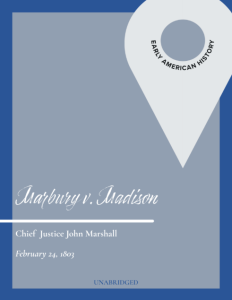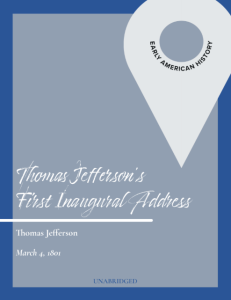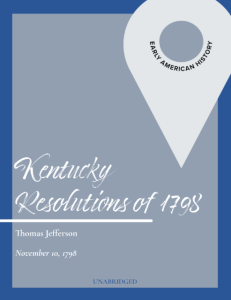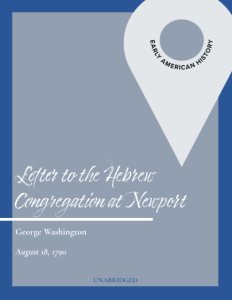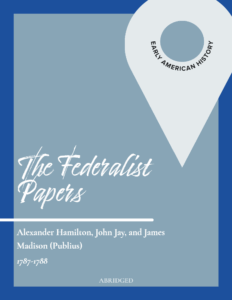
The opposite of the rule of law is the arbitrary rule of individuals.


Capital determines whether a society will be prosperous or poor, well-fed or not, populated by independent and self-reliant citizens or dependent subjects. An abundance of nutritious food, clean water, sturdy homes, safe modes of transportation, reliable sources of heat and power, modern medicines, and many other products and technologies that improve the quality of human life are impossible without capital.
A teacher can help students understand what capital is by encouraging them to think of capital as an individual’s “starter pack” for being productive and getting things done. Capital includes the tools, money, and other valuable resources a person needs to create something of value, or to solve a problem in order to create wealth.
For example, if you wanted to start a lemonade stand, the money you use to buy cups, lemons, water, and a sweetener is capital. While money is an important form of capital, capital can include other resources that help you create wealth for yourself by producing value for others.
Other Kinds of Capital:
Capital is anything you can use to “build” something that will provide experiences of value for other people. Money is the most obvious example of capital, but creativity, friendships, and even your honesty and intelligence, can be just as important, maybe even more important in some circumstances.
So, yes! Capital is cash and more: Capital includes any resource that helps you be more productive. Ask students: What kinds of capital do they have? Maybe it is their energy, ideas, or even their ability to make people laugh. Remind them that everyone—even people with little or no money—have important capital over which each person has much control: A person’s own reputation, honesty, and trustworthiness.
Evaluating incentives
One of the most important questions within any society is: Who will allocate capital? One possibility is that individuals choose whether, how, when, where, and why to spend their own money and invest their own capital. Another option is that political elites within government will tax citizens and confiscate the wealth that others have created, and then those in government will choose how to allocate other people’s their capital.
Individuals choosing how to invest their own capital have strikingly different incentives than politicians and bureaucrats in government spending other people’s money.
As we discuss in another section, profit is the happiness of other people. When individuals and business owners make their own choices about how to allocate and when to invest their own capital, they aim to earn a profit—they want a return on their investment—which is another way of saying they’re trying to make other people happy by producing value for them.
When those in government choose how to spend other people’s money, they serve their own interests, usually by expanding the scope and power of government. That is worth repeating: Business owners allocate their own capital in order to make a profit for themselves by making other people happy; government allocates other people’s capital in order to extend the power and control of government.
Every new government spending program, after all, requires expanding the class of unelected bureaucrats, adding new levels of control over what citizens may do, and adding new kinds of taxpayer-funded government competition to businesses and other private organizations.
Incentives of Allocation
For politicians and bureaucrats, resource allocation often means achieving political ends or aiming for short-term gains. Without direct knowledge of costs or profits, these decisions can be quite unpredictable.
When private individuals choose how to invest or spend their own money, they have strong incentives to make careful, strategic decisions. If they invest wisely, they personally reap the rewards; if they invest foolishly, they suffer the losses. This direct link between decisions and consequences encourages efficiency and accountability. Individuals are motivated to seek the highest return (or best use) for their funds, and they also bear the risk of losing their capital if a project fails.
By contrast, when those in government take capital from citizens through taxation, politicians and bureaucrats end up allocating resources that are not their own. As a result, several distortions can arise:
In short, when individuals allocate their own funds, they have personal incentives—financial risk and reward—to be careful stewards of their capital. When governments collect taxes and decide how to spend them, officials are allocating other people’s funds and often do so under weak or no incentives for efficiency, with less direct accountability for mistakes, and with political or bureaucratic considerations that can overshadow the goal of maximizing societal well-being.
 Nº1
Nº1
Description
Download PDF Download ePub Button 3
The rule of law stands as one of the most important discoveries in the history of political science. The opposite of the rule of law is the arbitrary rule of individuals and the unpredictable exercise of government power.
The rule of law was a fundamental principle in the American Founding, representing the idea that no individual, including a government official, is above the law, and that laws must govern both ordinary citizens and those in government.
Rooted in the traditions of English common law and Enlightenment thought, the American Founders saw the rule of law as essential for securing liberty, justice, and a functioning republican government.
Government power is limited: The Constitution established a system of checks and balances to prevent any branch of government from exceeding its delegated authority.
Laws are clear and stable: Laws should be publicly known, consistently enforced, and not subject to sudden, arbitrary changes.
Equality before the law: All individuals, regardless of rank or status or family name, are subject to the same laws.
Protection of rights: Laws should protect natural rights, such as life, liberty, and property, which governments exist to secure.
Preventing Tyranny: The Founders were deeply influenced by the abuses of power under British rule, such as taxation without representation and arbitrary enforcement of laws. The rule of law was a safeguard against tyranny and unchecked power.
Securing Liberty: By ensuring that laws, not individuals, governed the nation, the rule of law provided a framework for protecting citizens’ freedoms.
Promoting Justice: A legal system rooted in the rule of law created predictability and fairness, critical for resolving disputes and fostering trust in government.
In Federalist #62, James Madison explained:
– [I] will be of little avail to the people, that the laws are made by men of their own choice, if the laws be so voluminous that they cannot be read, or so incoherent that they cannot be understood; if they be repealed or revised before they are promulgated, or undergo such incessant changes that no man, who knows what the law is to-day, can guess what it will be tomorrow.
He then concluded by asking a rhetorical question: “Law is defined to be a rule of action; but how can that be a rule, which is little known, and less fixed?”
The rule of law was central to the Founders’ plan for America. It provided the foundation for a government of limited, accountable power and ensured that liberty and justice could flourish in a society free from arbitrary rule. The rule of law remains inseparable from justice and liberty today.
